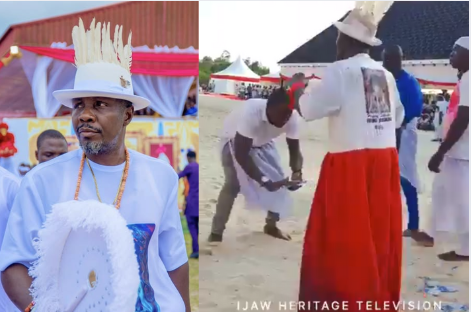The Economic and Financial Crimes Commission (EFCC) has publicly declared its intention to investigate former Niger Delta militant leader, Government Ekpemupolo, alias Tompolo, for alleged abuse of the Nigerian naira. This announcement follows a viral video circulating on social media, purportedly showing Tompolo being sprayed with ₦1,000 notes during his 54th birthday celebration in April. The video sparked widespread condemnation and accusations of selective enforcement against the EFCC, with many social media users questioning the agency’s commitment to applying the law equally across all strata of society.
The incident highlights the growing public concern over the blatant disregard for the Central Bank of Nigeria’s (CBN) regulations regarding the handling and treatment of the national currency. The act of spraying money, often seen at social gatherings and celebrations, is considered an abuse of the naira and a punishable offense under Nigerian law. The CBN has repeatedly warned against such practices, emphasizing the damage it causes to the currency and the potential implications for the economy. This incident involving Tompolo has reignited the debate on the need for stricter enforcement of these regulations and the importance of holding individuals accountable, regardless of their social standing or political influence.
The EFCC’s statement, “Nobody is above the law. Tompolo will have questions to answer!”, is a direct response to the public outcry and aims to reassure Nigerians that the agency is committed to upholding the law. However, the agency’s past actions have been perceived by some as inconsistent, leading to skepticism about the sincerity of their pronouncements. Previous cases involving public figures and celebrities, such as Emeka Okonkwo (E-Money), Iyabo Ojo, and Ayo Makun, have raised questions about the EFCC’s selectivity in pursuing such cases. While these individuals have faced scrutiny for similar offenses, the perception remains that more powerful figures are often shielded from the full force of the law.
Social media has played a significant role in amplifying the public’s reaction to this incident. The rapid dissemination of the video and the subsequent comments from users reflect the growing frustration with the perceived double standards in the application of the law. Many commentators have drawn comparisons between Tompolo’s case and previous instances of naira abuse, highlighting the apparent disparity in the EFCC’s responses. The online discourse has also underscored the broader issue of accountability and the need for a more transparent and equitable legal system in Nigeria. The public’s demand for equal application of the law, regardless of social status or political affiliations, is a clear message to the authorities.
The EFCC’s decision to investigate Tompolo will be closely watched by the public. The outcome of this investigation will serve as a litmus test for the agency’s credibility and its commitment to tackling financial crimes without prejudice. The pressure is on the EFCC to demonstrate that its actions are driven by the principles of fairness and impartiality, rather than political expediency or selective enforcement. The agency’s ability to handle this case effectively will be crucial in restoring public trust and demonstrating its resolve to uphold the law.
This incident offers a valuable opportunity for Nigeria to address the broader issues of financial indiscipline and respect for the national currency. Beyond the specific case of Tompolo, it is imperative to cultivate a culture of responsible financial behavior and adherence to the regulations governing the handling of the naira. Public awareness campaigns, educational initiatives, and consistent enforcement of existing laws are essential steps in achieving this goal. The long-term health of the Nigerian economy depends on a collective commitment to respecting and preserving the value of its currency. The Tompolo incident serves as a stark reminder of the consequences of financial indiscipline and the need for a more robust and equitable legal framework to address such offenses.














